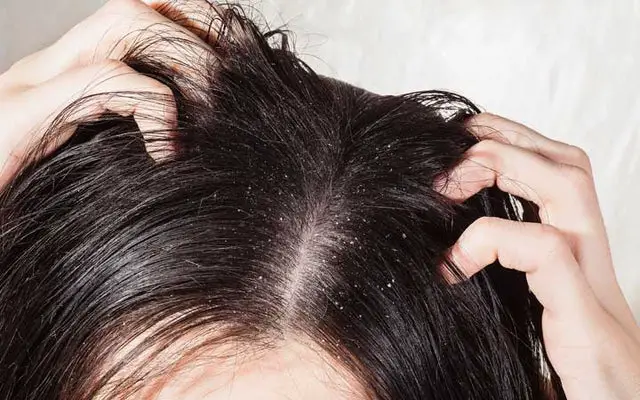Imagine trying to garden in a desert – the soil is dry, cracked, and unable to support growth. Similarly, a dry scalp can feel like barren land, flaking and itching with every move. You’re not alone; millions of people struggle with dry scalp and dandruff, searching for a solution to soothe and calm their irritated skin. Fortunately, nature has provided some powerful tools to help rescue your scalp from this desolate state. But what are the best oils to use, and how can you harness their benefits to restore balance and health to your scalp?
Key Takeaways
- For a dry scalp and dandruff, choose oils with a pH close to the ideal scalp pH range of 4.5 to 5.5 to minimize disruption.
- Coconut oil’s antioxidants and fatty acids soothe and moisturize the scalp, making it an excellent choice for dry scalp and dandruff relief.
- Tea tree oil’s antifungal and antibacterial properties combat fungal infections and dandruff, while also reducing itchiness and inflammation.
- Carrier oils like jojoba and sweet almond oil dilute essential oils, balance pH levels, and nourish the scalp, promoting healthy hair growth.
- Massage warm oil into the scalp using circular motions to stimulate blood flow, reduce flaking, and promote healthy scalp function.
Choosing the Right Oil
When dealing with a dry scalp, finding the right oil can be a game-changer. You need to take into account factors that will help maintain the scalp’s natural pH balance. The ideal scalp pH is slightly acidic, ranging from 4.5 to 5.5.
Oils with a pH close to this range will minimize disruption to your scalp’s natural environment.
Another vital factor to take into consideration is oil absorption rates. You want an oil that absorbs quickly and deeply into the scalp without leaving a greasy residue.
Oils that penetrate slowly may clog pores and exacerbate dryness. Look for oils with a moderate to high absorption rate, as these are more likely to provide the necessary nourishment without causing buildup.
Take into consideration the fatty acid composition of the oil as well. Oils high in essential fatty acids, such as linoleic and oleic acid, can help replenish and restore your scalp’s natural barrier function.
Benefits of Essential Oils
Several essential oils have proven benefits for a dry scalp, and incorporating them into your routine can be a valuable addition to your scalp care regimen.
You may be wondering how essential oils can help. With a history dating back thousands of years, essential oils have been used to treat various health issues, including skin and scalp problems.
Research has shown that certain essential oils can help soothe and calm the scalp, reducing inflammation and itchiness.
To reap the benefits of essential oils, you need to guarantee you’re using high-quality products.
The quality of the oil can substantially impact its effectiveness. Look for essential oils that are extracted from organic sources, using methods that preserve their natural properties.
Avoid oils that have been adulterated or contaminated with synthetic chemicals.
When choosing an essential oil, consider the specific benefits you’re looking for.
For example, if you’re looking to reduce inflammation, you may want to opt for an oil with anti-inflammatory properties.
Natural Oils for Relief
Focusing on natural oils, you can find relief from a dry, itchy scalp with some well-researched options. Coconut oil, rich in antioxidants and fatty acids, is an excellent choice for soothing and moisturizing your scalp. Olive oil, with its anti-inflammatory properties, can help reduce redness and irritation. Tea tree oil, known for its antifungal and antibacterial properties, can combat fungal infections and dandruff.
When using natural oils, it’s vital to store them properly to maintain their potency. Keep them in a cool, dark place, away from direct sunlight and heat sources. Always perform a patch test before applying a new oil to verify you’re not allergic.
Incorporating scalp massage techniques can enhance the benefits of natural oils. Gently massage your scalp with your fingertips in circular motions to increase blood flow and promote oil absorption.
Leave the oil on for at least 30 minutes before shampooing to allow it to penetrate deeply. By combining natural oils with proper storage and scalp massage techniques, you can experience significant relief from a dry, itchy scalp.
Carrier Oils for Scalp Health
By blending carrier oils with essential oils, you can create a customized solution for your scalp health. Carrier oils play a vital role in diluting essential oils, making them safe for topical application.
They also provide additional benefits that support scalp health.
When choosing a carrier oil, consider the following options:
- Jojoba oil: closely resembles the natural oils produced by our scalp, helping to balance pH levels and support hair growth.
- Sweet almond oil: rich in vitamins and antioxidants, it nourishes and moisturizes the scalp, promoting healthy hair growth.
- Grapeseed oil: lightweight and non-greasy, it helps to regulate scalp pH and reduce inflammation.
- Coconut oil: rich in fatty acids, it moisturizes and soothes the scalp, supporting hair growth and reducing dandruff.
These carrier oils can be blended with essential oils to create a customized solution that addresses your specific scalp concerns.
How to Use Oils Effectively
When it comes to incorporating oils into your scalp care routine, understanding how to use them effectively is crucial for achieving ideal results.
You’ll want to start by choosing the right oil blend for your specific scalp concerns. Oil blending allows you to combine the benefits of multiple oils, creating a customized solution that targets your unique needs.
For example, mixing a carrier oil like coconut or olive oil with an essential oil like tea tree or lavender can create a potent blend that tackles dandruff and soothes irritation.
To get the most out of your oil blend, try incorporating scalp massage into your routine.
Massage stimulates blood flow, which can help reduce flaking and promote healthy scalp function. Simply warm the oil between your palms, then gently massage it into your scalp using circular motions.
Focus on areas with the most buildup or irritation, and be sure to rinse thoroughly after treatment.
Frequently Asked Questions: Best Oil for Dry Scalp and Dandruff
Can I Use Oils on a Scalp With Open Sores or Wounds?
You should avoid using oils on a scalp with open sores or wounds, as this can hinder wound healing concerns and affect oil absorption rates, potentially causing further irritation or infection.
How Long Does It Take to See Results From Using Scalp Oils?
As you massage oil into your scalp, imagine it absorbing like a sponge, slowly revitalizing your skin. You’ll start to notice a transformation timeline unfolding: within 2-4 weeks, your scalp will feel softer, and by 6-8 weeks, flaking will decrease, thanks to the oil’s absorption rate.
Can I Mix Different Oils for a Custom Blend for My Scalp?
You can create a customized concoction by mixing different oils to harness scalp synergy, enhancing their individual benefits; just be sure to research and understand the properties of each oil to certify a harmonious blend that addresses your specific scalp needs.
Will Scalp Oils Stain My Hair or Pillowcase?
When you spill coffee on your shirt, it’s a real pain to remove, right? Similarly, oily residue can stain your hair and pillowcase if not absorbed properly. Look for oils with fast absorption rates and use a fabric protector to prevent stains, ensuring a hassle-free scalp care routine.
Can I Use Scalp Oils if I Have a Sensitive Skin?
You may need to exercise caution when using scalp oils if you have sensitive skin, as some formulas can trigger skin reactions or exacerbate product buildup, so always patch test and start with small amounts to gauge your skin’s tolerance.
Conclusion
You’ve now discovered the secret to a healthier, flake-free scalp. By incorporating coconut, olive, and tea tree oils into your routine, you’ll be saying goodbye to irritation and hello to a calm, soothed scalp. Remember to blend them with carrier oils and massage them in with gentle circular motions to stimulate blood flow and reduce flaking. With these natural wonders, you’ll be on your way to a scalp that’s balanced, nourished, and radiant.














